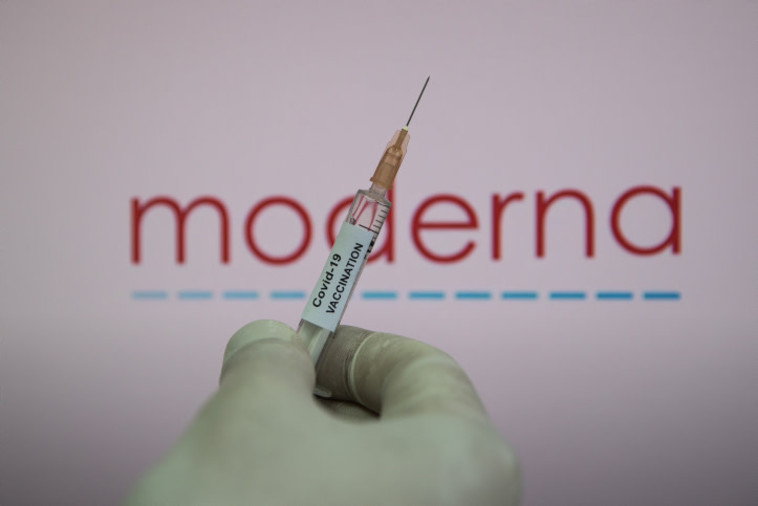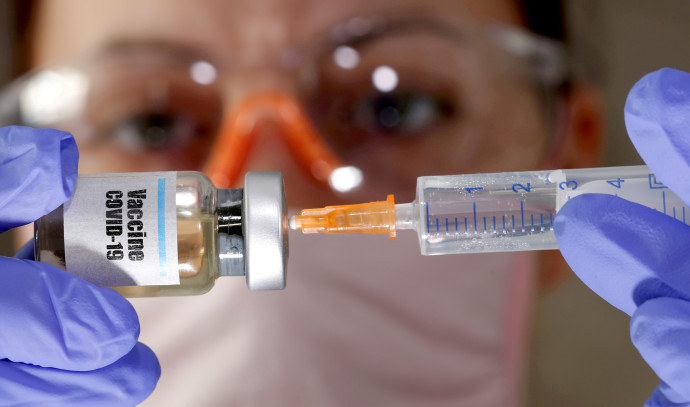After many months of waiting, a vaccine for Corona has finally arrived and in Israel an “give a shoulder” operation has begun, in which the population in the country will be vaccinated. We have compiled for you all the answers to the most important questions related to vaccines, which were developed in an expedited process – something that causes great concern among many Israelis. Doctor of Biology Noam Leviathan and Doctor of Immunology Erez Gerti, from the Davidson Institute for Science Education, are making an order for you:
How does the vaccine work?
The coronary vaccine from the companies Pfizer, Biontech and Moderna contains a molecule called RNA, which encrypts the instructions for building a viral protein called Spike – the same protein that gives the corona virus its thorny appearance and also allows it to penetrate human cells and infect them. The RNA is injected into the muscle, it enters the cells and causes them to produce many copies of the viral protein. Unlike infection with a real virus, here the cells produce one protein, not the entire virus.
In no time, our immune system recognizes that something is wrong. She discovers that the cells that received the vaccine are producing a protein that they are not supposed to produce and studies its structure. When the day comes, when the vaccinated person is exposed to the real virus, his immune system will immediately recognize him and act against him. Thus we skip a long learning process, of about two weeks from the moment of infection, and allow our body to learn the virus without having to deal with a real attack at the same time.
What is the difference between the Pfizer vaccine and Moderna?
Both vaccines are based on similar technology, their effectiveness is similar and they are given in two doses. The time difference between administering the two doses is three weeks in Pfizer’s vaccine and four weeks in Modern. The main difference between the vaccines Is in their storage. The modern vaccine is much simpler to store and distribute. Pfizer’s vaccine should be kept at a temperature of 70 degrees Celsius below zero and the company announced that it has developed special packaging that allows it to maintain this temperature for 30 days, as long as you make sure to fill them with dry ice.
 Need to be realistic about Pfizer (Photo: gettyimages)
Need to be realistic about Pfizer (Photo: gettyimages)- Are you afraid of the vaccine for Corona? These are the things you must know Click for details
Are vaccines likely to eradicate the plague?
It is very likely that a vaccine for corona will eventually eradicate the epidemic, but the vaccine approval does not mean that we will return to routine soon. This will take at least a few months. The first hurdle that stands in the way of returning to routine is the availability of vaccines. It will be a while before there are enough vaccines for the entire population, in Israel and around the world. Initially the vaccines will help protect mainly the most vulnerable people in the population and vital workers in the health system. Until the majority of the public is vaccinated, we will have to continue to defend against the virus in the familiar ways – physical distance and wearing masks. Another delay is due to the fact that it takes time for each vaccinated person to develop immunity to the virus. The vaccine is given in two doses, between which there is a gap of close to a month. After the second dose, another two weeks will pass before we are considered vaccinated.
In addition, it is not known for how long a vaccine for corona protects against the disease. Immunity may fade over time and impulse injections will be needed to preserve our body’s immune memory and ensure that we remain protected from the virus. It is also known that the vaccine protects against disease, but it is not yet clear whether it also prevents the actual transmission of the virus, so the possibility that vaccinated people will become infected, remain healthy but pass on the pathogen to others. As long as we do not know with a high degree of certainty that the vaccine prevents human infection, even vaccinated people will have to continue to take steps to make sure that they do not become infected with the virus and infect others. However, it is very likely that a vaccine does prevent infection with the virus or at least reduces the risk of being infected: Experiments performed on transparent animals that have been vaccinated have been resistant to infection with the virus and therefore could not spread it further.
In any case, it is hard to believe that vaccines will exterminate such a common virus in the near future, which has already spread all over the world. It seems that the corona virus SARS-CoV-2 is here to stay, and that we will have to continue to vaccinate against it, as we do with other viruses.
Margaret Keenan is the first in the world to receive the Pfizer vaccine against the corona virus (Photo: Reuters)
How do you know that the vaccine is effective?
Before the experiments in humans began, a corona vaccine was tested on animals, especially monkeys, and it was found that when they tried to infect monkeys vaccinated with the corona virus – they were not infected. In the second phase of clinical trials in humans, indices examining the effectiveness of the vaccine were examined – the levels of antibodies in the blood over time (four months currently), the ability of the antibodies formed in the blood of the vaccinated to neutralize the virus in laboratory conditions and other indicators of immune memory.
In addition, in the third and most comprehensive phase of the trials, 44,000 people who received the real vaccine or the placebo vaccine received by the control group were monitored. Next, they located everyone who had contracted Corona after receiving the treatment and checked which of them had received which vaccine. It was found that the vast majority of patients were from the group that received a sham vaccine. All these findings indicate that the vaccine is effective in preventing corona disease. In the coming months we will see if it also prevents the transmission of the virus – most likely yes.
 Vaccine for modern corona (Photo: Jonathan Zindel, Flash 90)
Vaccine for modern corona (Photo: Jonathan Zindel, Flash 90)How long is it effective?
Since the vaccine trial started only a few months ago, It is impossible to know exactly how long it has remained effective. However, the results of experiments performed on humans and other animals show that the levels of antibodies in the blood remain high even after four months of administering the vaccine, which indicates a strong immune response. There is a chance that a year later we will need to get another dose, similar to other vaccines, but it is too early to know.
How do you know the vaccine is safe?
Pfizer’s Corona vaccine has been given to about 22,000 people in recent months and no serious side effects have been found. Approval to the vaccine is given two months after the participants in the clinical trial have received their second dose of vaccine – more than enough time to detect abnormal side effects. The monitoring of the trial participants continues even now, in order to make sure that no unexpected side effects appear later.
Who should not be vaccinated?
The Pfizer vaccine has been approved for use from the age of 16. It is not currently intended for younger children, as the experiment did not include this age group. Also, although there is no known reason to fear vaccination for pregnant or lactating women, it has not yet been tested on these groups and therefore it is recommended not to vaccinate them yet. Due to two cases of allergic reactions to the vaccine in the UK, people with a history of severe allergic reactions (anaphylaxis) are currently advised to avoid the vaccine, as an act of preventive caution.
What are the known side effects?
The most common side effect of a corona vaccine is pain at the injection site (84 percent). Other not uncommon side effects include dizziness (62 percent), headache (55 percent), chills (38 percent), joint pain (23 percent) and fever (14 percent). The risk of more serious side effects is less than half a percent, and no life-threatening side effects have been documented during the huge vaccine trial. Most experimenters reported side effects that lasted a maximum of two days, especially after receiving the second dose of vaccine. Side effects were less common in people over the age of 55.
And rare or long-term side effects?
As far as we know there should be no such effects, as it is very rare for a vaccine to have a side effect beyond the short period after it is received. However, in science one tries to assume as little as possible and test as much as possible. Thus, the clinical trials are ongoing and the volunteers who received the vaccines remain under continuous monitoring for any side effect or complication that may arise.
Pfizer’s corona vaccine. Photo: Reuters
So why not wait a year or two to know for sure?
The reason is simple – the price will be much too high. Although it is the first vaccine in this technology to be approved for use, clinical trials conducted in recent years on RNA technology have not found any long-term side effects that should cause concern. Beyond that, the virus itself causes a variety of short-term complications, and now we are also beginning to see long-term complications that it causes, so it seems that the potential risk that the vaccine may have is nil compared to the danger posed by the disease itself.
I heard a scary rumor about the corona vaccine, how do you know if you can believe it?
In the near future, we will probably see a lot of rumors circulating about the vaccine on social networks in the messaging apps and in the media. It is important first of all not to get stressed. The more extreme the rumor, the more likely it is to be baseless. Check with trusted sources, consult qualified medical professionals, and by no means make a decision here or there based on unverified information. And remember, if the warning is really important, you will come across it in a lot of places, such as the news editions, science sites, Ministry of Health publications and more – not just in mysterious messages on WhatsApp.
Is it really better than the disease?
Yes. Definitely. The vaccine is effective, has few side effects, and even if it turns out that his immune memory is relatively short, we can get a booster dose a year later. The disease, on the other hand, can progress to pneumonia, prolonged hospitalization in intensive care and even death – and not just in the elderly. Many patients then feel weak and need a lot of time to recover. And if that is not enough, it is also not yet clear whether infection with the virus prevents re-infection. The virus appeared in the world about a year ago, so we do not yet know enough about its long-term effects. Experiments on tens of thousands of people show that the vaccine is better in any measure than infection with the wild virus.
When they started the vaccine did they not make all sorts of shortcuts?
Development of a vaccine usually takes several years. Much of this time is spent on bureaucracy, resource recruitment, volunteer recruitment and waiting in line at regulatory bodies like the Food and Drug Administration in the United States (FDA) to review each and every stage of the trials.
Already at the beginning of the plague it was clear that in order to get out of it we would need a vaccine for corona. Therefore, it was decided to cut everything that would not harm efficiency and safety. Many governments, led by the United States, have invested billions of dollars in companies that have shown potential to get vaccinated in a reasonable amount of time. In addition, some of the experimental stages were done in a slight overlap to the stage that preceded them, without waiting for its completion, and of course the recruitment of volunteers was simple – people stood in line to join the clinical trials.
Furthermore, one of the factors that tends to delay trials of new vaccines is the need to wait until enough of the trial participants have contracted the disease so that it is possible to check how many of them received the vaccine and how many were in the control group. Since we are in the midst of an epidemic caused by a highly contagious virus, we reached our destination within a few months.
I have heard that the vaccine harms women’s fertility. This is true?
Definately not. There is no biological biological reason for such a thing. The vaccine causes the body to make antibodies against one small part of the corona virus and they are only able to harm it. Moreover, infection with the virus itself causes disease as well as the formation of antibodies in those infected. Had there been any basis for the rumor we would have already seen an impairment in the fertility of women who fell ill in Corona. It did not happen at all.
What about the Russian vaccine?
Vaccine for corona “Sputnik 5”, developed in Russia, underwent two stages of clinical trials and was approved for use in Russia without passing the third stage. Today, this phase is also being conducted in several countries around the world, but no findings have yet been published and tested by an independent source, so it is difficult to know if it is safe and effective.
The vaccine itself is based on a “viral vector” mechanism, meaning that they have taken a virus that is not dangerous to humans and cloned into it the building instructions of one of the proteins of the corona virus. The engineered virus is supposed to infect cells in the body of the vaccinated and cause them to produce the protein. This is a known method that has already been approved for use on humans and is considered safe. However, as long as the vaccine has not passed the three stages of the clinical trials and its results have been tested by an objective health authority, there is no way to know if it is indeed safe and effective.
And the Biological Institute vaccine?
A corona vaccine manufactured in Israel at the Biological Institute recently began the first phase of clinical trials, designed to test its safety. The statements of the institute’s staff indicate that the second phase, which is intended to test its effectiveness, will begin soon. This vaccine is also based on a virus that is not dangerous to humans and contains the instructions for building that viral protein. We will have to be patient and see if the vaccine successfully passes the clinical trials.
